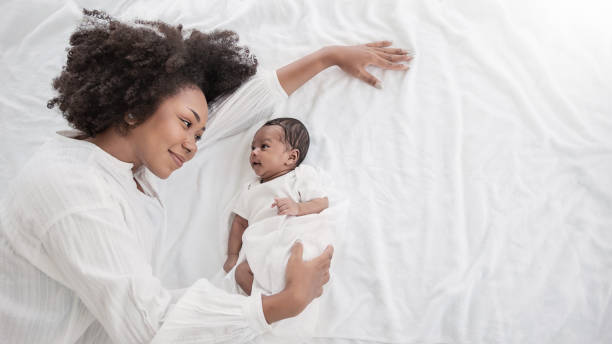

Closeup portrait of beautiful young African American mother day girl kiss healthy newborn baby sleep in bed flat lay copy space. Healthcare medical love black woman lifestyle mother's day, top view
Bringing a baby into the world is often seen as a joyful experience, but for many new mothers, it can also bring overwhelming emotions, self-doubt, and anxiety.
EKO HOT BLOG reports that while these feelings are common, intense sadness, loneliness, severe mood swings, or frequent crying spells may indicate postpartum depression (PPD), a serious condition that requires attention.
This article explores everything you need to know about postpartum depression, including its types, risk factors, symptoms, and available treatment options.
According to the Cleveland Clinic, postpartum depression (PPD) is a type of depression that occurs after childbirth. It affects up to 15% of new mothers and is characterized by emotional highs and lows, excessive crying, fatigue, guilt, and anxiety.
There are three main types of postpartum disorders:
Affects 50% to 75% of new mothers
Symptoms include sadness, anxiety, and prolonged crying for no clear reason
Begins within the first week after delivery and typically resolves within two weeks without medical treatment
Support from family, friends, and partners can help manage symptoms
More severe than baby blues, affecting about 1 in 7 mothers
Symptoms include extreme mood swings, frequent crying, irritability, fatigue, and feelings of guilt or inadequacy
Can make it difficult to care for oneself or the baby
A history of postpartum depression increases the risk of recurrence in future pregnancies
A rare but severe condition, affecting 1 in 1,000 new mothers
Symptoms appear soon after childbirth and may include severe agitation, confusion, paranoia, delusions, hallucinations, and suicidal thoughts
Requires immediate medical attention, including hospitalization and treatment with medication and therapy
Several factors can increase the likelihood of developing postpartum depression, including:
A personal or family history of depression or PPD
Lack of social support
Relationship conflicts or marital stress
Unplanned or complicated pregnancies
Young maternal age (under 20) or single parenthood
Caring for a baby with special needs or excessive crying
Closeup portrait of beautiful young African American mother day girl kiss healthy newborn baby
PPD can manifest in various ways, including:
Persistent sadness, hopelessness, or excessive guilt
Anxiety or constant worry
Loss of interest in activities once enjoyed
Changes in appetite or sleep patterns
Fatigue and lack of motivation
Difficulty bonding with the baby
Thoughts of self-harm or harming the baby (seek urgent medical help)
Postpartum depression is treatable, and seeking help is essential. Treatment options include:
Click here to watch video of the week
Tsiga along with nine other residents was abducted on February 5, 2025. The kidnappers remained…
The Feud between portable and speed Darlington started since last month Portable had once defeated…
The Lagos SME Trade Fair is scheduled to take place at Balmoral Hall in the…